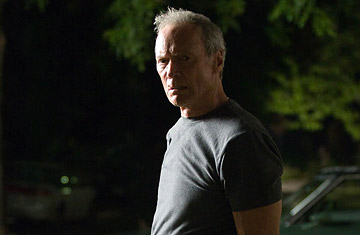
Settling a score with himself, Clint Eastwood in Gran Torino.
(2 of 2)
Now, decisiveness is fine, but it raises the question, Is Clint Eastwood too easily satisfied? Sometimes scripts do need to be rewritten or pared down. Often actors will be strongest in Take 13 or 30. And shooting a movie fast isn't the same as making it move, which Eastwood's films don't always do; they can be both slack and slapdash. Most critics love Clint the auteur, and there's plenty to admire, but his directorial style is in danger of being as overrated as his acting is underrated. He's a fine director when he connects with the linear clarity of a simple story--which is why the teeming narratives of Mystic River and Changeling don't work quite so well as straight-ahead fables like Million Dollar Baby and Gran Torino. The latter movies have one other advantage: the director is also the star.
Cleansing Dirty Harry
There are many men, of sullen disposition and modest achievement, who watch a Clint Eastwood movie and wish they could resolve their daily dilemmas with a blast of gunfire and walk away free. Walt Kowalski might be such a one. At his wife's funeral, he can swat away the condolences of relatives and the parish priest, but he can't evict them from his life. Retired after 50 years on the Ford assembly line, Walt is as much an endangered species as the company he worked for. While he carefully maintains his house, white picket fence and all, the neighbors' homes have chipped paint and the sag of misuse. He's a cowboy stuck in the desolate Midwest, and instead of stubborn Indians and stud gunslingers, he's surrounded by Hispano-punks and Hmong immigrants from Southeast Asia. And now Tao (Bee Vang), a Hmong teen who's bullied by both ethnic groups, has broken into Walt's garage to steal the old man's most treasured possession: his 1972 Gran Torino. (See the 100 best movies of all time.)
Channeling Henry Fonda's balky geezer in On Golden Pond (though he's robust where Fonda was frail), Walt is clearly destined for interracial rehab; the movie's story is the thawing of this great slab of mean. He warms to Tao, who could use some foster-fathering; to Tao's well-adjusted sister Sue (Ahney Her); and to their whole adorably folkloric clan. But Walt needs more than living among the Hmong. As a family elder tells him, "You're not at peace."
After stewing for years in what might seem like standard working-class racism, Walt has to resolve his soldiering in the Korean War--when, he tells Tao, "I used to stash guys like you five feet high in Korea. Used 'em for sandbags." Still haunted by killings that now weigh on him like war crimes, he must emerge from his white-picket cave of bitterness and find a purpose for his life: to become a guardian angel to Tao and Sue and an angel of death to anyone who'd do these decent kids harm.
In other words, Walt must both be a Man with No Name, a Dirty Harry, and find a cause beyond duty or blood sport to atone for his Korean gunmanship. This fits with Eastwood's rounding out of his familiar character in later films--challenging the audience to accept "Cleent" when he does surprising things. In Million Dollar Baby, killing was an act of mercy. Here, for Walt to put his life on the line, in a kind of suicide mission, is a final act of contrition.
Eastwood the director, commendably casting major roles from within the Hmong community, elicits a naturalness from his untutored young stars, though for a while you must take the performances on faith, as Walt learns to take the people. But Eastwood the actor is in total command, daring himself to new depths. You'll see a tough man cry--one of the few flourishings of tears in the Eastwood oeuvre. That unaffected emotion eventually informs the whole movie, making it a wrenching, rewarding experience.
If Gran Torino is his last hurrah as a movie star, that's too bad. But he couldn't find a better one to go out on--not just as a valediction for the crusty character he's played so often and for so long but as a final twisting validation of it. Along with his famous guts, Dirty Harry has a heart.
